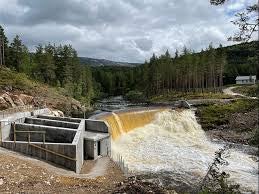The bill was co-sponsored by Senators Begich (D-AK), Bingaman (D-NM), Cantwell (D-WA), Crapo (R-ID), Murray (D-WA), Risch (R-ID), Whitehouse (D-RI), and Wyden (D-OR), making hydropower a major area of consensus on energy in the 112th Congress.
“There is no question that hydropower is, and must continue to be, part of our energy solution, as it is the largest source of renewable electricity in the United States,” said Murkowski. ” Hydropower is certainly something we understand in my home state of Alaska, where hydro already supplies 24 percent of the state’s electricity needs and over 200 promising sites for further hydropower development have been identified.”
“This bill allows us to highlight the potential for development of additional hydropower resources in an environmentally responsible way,” added Senator Bingaman. “It includes provisions that address the potential for hydropower development from smaller sources that are available, even in a dry state like New Mexico. Additionally, the bill emphasizes the need to improve efficiency at existing facilities and to tap into the hydropower potential at existing non-powered dams. I appreciate the ability to work with Senator Murkowski and the other members of the committee on this bipartisan bill.”
The Hydropower Improvement Act sets a dynamic hydropower agenda for the nation. Key highlights include:
• The Bill establishes a competitive grants program and directs the Energy Department to produce and implement a plan for the research, development and demonstration of increased hydropower capacity;
• It provides the Federal Energy Regulatory Commission with the authority to extend preliminary permit terms; to work with federal resource agencies to make the review process more efficient for conduit and small hydropower projects; and to explore a possible two-year licensing process for hydropower development at non-powered dams and closed loop pumped storage projects;
• It calls for studies on the resource development at Bureau of Reclamation facilities and in conduit projects, as well as on suitable pumped storage locations. Importantly, by utilizing existing authorizations, the bill does not represent new funding.
The bill has been welcomed by the national-hydropower-association, who applauded each original co-sponsor for their early support of this job- creating clean energy bill.
“Hydropower has more multi-region and bipartisan support than any other clean energy technology. It is critical to our clean energy future that this legislation is passed as soon as possible,” said National Hydropower Association Executive Director Linda Church Ciocci. “Hydropower is already responsible for nearly seven percent of total US electricity generation and two-thirds of our renewable electricity. This bill recognizes the vital role of hydropower as an affordable, reliable, available and sustainable domestic energy source.”
“The Hydropower Improvement Act will bolster the positive economic and job creation benefits of hydropower projects, supply chain companies and low-cost hydroelectricity in all fifty states,” addedd nha President Andrew Munro, also Director of External Affairs for Washington State’s Grant County PUD. “The US hydropower industry supports President Obama’s goal of generating 80 percent of the nation’s electricity with clean energy sources by 2035. Hydropower will play a critical role in reaching that goal and this bill will help America get there sooner.”






